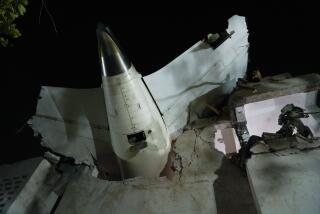Boeing Raises Layoff Target to 53,000
- Share via
In the most visible blow to U.S. industry from the Asian economic crisis, Boeing Co. said Tuesday it will sharply slow production of its commercial jetliners and slash up to 25,000 jobs on top of previously announced layoffs of 28,000 during the next two years.
Until early this year, Boeing was struggling to keep up with booming orders from around the world, but faltering airlines in such countries as the Philippines, Japan and South Korea have delayed deliveries and future orders in recent months.
Now, the Seattle-based company is slamming on the brakes, setting in motion a deep retrenchment. The preponderance of the 53,000 job losses will occur at Boeing’s vast complex of factories in Puget Sound, but aircraft subcontractors across Southern California will probably feel the pinch.
The Boeing problems are almost certain to trigger cuts at major subcontractors, such as Los Angeles-based Northrop Grumman, which makes the 747 jetliner fuselage at a plant in Hawthorne.
Boeing said it will have eliminated only 8,000 jobs by the end of this year out of the 53,000 it expects to cut. The company would end the year with as few as 230,000 employees worldwide and could go as low as 185,000 by 2001. Boeing announced a range of estimated cuts, which at the lower end would have the company losing 48,000 jobs.
One of the biggest hits will come on the 747 jet program, where production rates will fall to two airplanes per month late next year, down from the current five per month. If market conditions do not improve, the rate will be cut to one plane per month in early 2000, the company said.
Earlier this year, Boeing lowered 747 assembly rates to 3.5 jets per month beginning in 1999. That change will hit particularly hard at Northrop Grumman, Boeing’s largest subcontractor on the 747 program and a solid supplier on other Boeing jets.
Northrop’s plant in Hawthorne has 1,800 employees and 600 contract workers on the program, according to Georgia Engle, a Northrop Grumman spokeswoman.
The Boeing announcement will trigger further job cuts at the Hawthorne facility, but Engle said the company has not yet quantified the expected layoffs. Northrop employed fewer than 1,000 workers in 1996, the last time the Hawthorne plant produced just two planes a month, according to Engle.
Boeing also warned of lower earnings and profit margins in the next few years, a development that is likely to send Boeing’s stock lower in trading today, analysts said.
“This one’s a bad one. . . . I thought that the company was in a better position to earn more money,” said Jack Modzelewski, an aerospace analyst at PaineWebber in New York. “Year 2000 is shaping up to be a bad year, and I don’t think this is the low-water mark.”
Much of the pain would be felt within Boeing’s sprawling commercial plane business, but the company has stressed that layoffs and previously announced consolidation moves will also affect its other businesses.
The latest production and job cuts go beyond rate reductions and layoffs announced earlier this year. They will affect nearly all of Boeing’s commercial jetliners. Boeing’s so-called classic model of the 737, as well as the Long Beach production lines of the MD-80, MD-90 and MD-11 jets, will not be affected by the latest revisions, the company said.
But in Long Beach, thousands of jobs will be cut next year and into early 2000 as part of previously announced layoffs--as Boeing phases out production of the MD-80, MD-90 and MD-11. Once those programs disappear, the new 717 plane, already in limited production, will be the only remaining commercial jet assembly line in Long Beach.
Aerospace analysts have for months expected further fallout from the situation in Asia, where airline traffic has dropped amid the economic crunch, prompting airlines there to postpone jet orders.
“Clearly, the economic slowdown in Asia is driving air traffic down, which impacts our customers’ plans and operations,” said Alan Mulally, Boeing’s new president of the commercial airplanes business. “Our actions today will match production to market demand.”
With Asian customers in a financial pinch, some analysts believe Boeing still will be struggling in 2002.
The analysts noted that while Asia’s financial woes may clamp down on the peaking airplane production business, it also means the delay in orders Boeing is suffering now will come back.
“It’s a two-edge sword,” said John Harbison, chief of the aerospace practice for Booz Allen & Hamilton in Los Angeles. “This obviously is a cyclical industry and we’re just coming off a robust peak. Some of the demand that was expected to be filled . . . for Asia is being pushed off. Presumably, some of that will carry over to the next trough. Over the long term, while it is very painful, it could bring more stability to the industry.”
More to Read
Inside the business of entertainment
The Wide Shot brings you news, analysis and insights on everything from streaming wars to production — and what it all means for the future.
You may occasionally receive promotional content from the Los Angeles Times.








